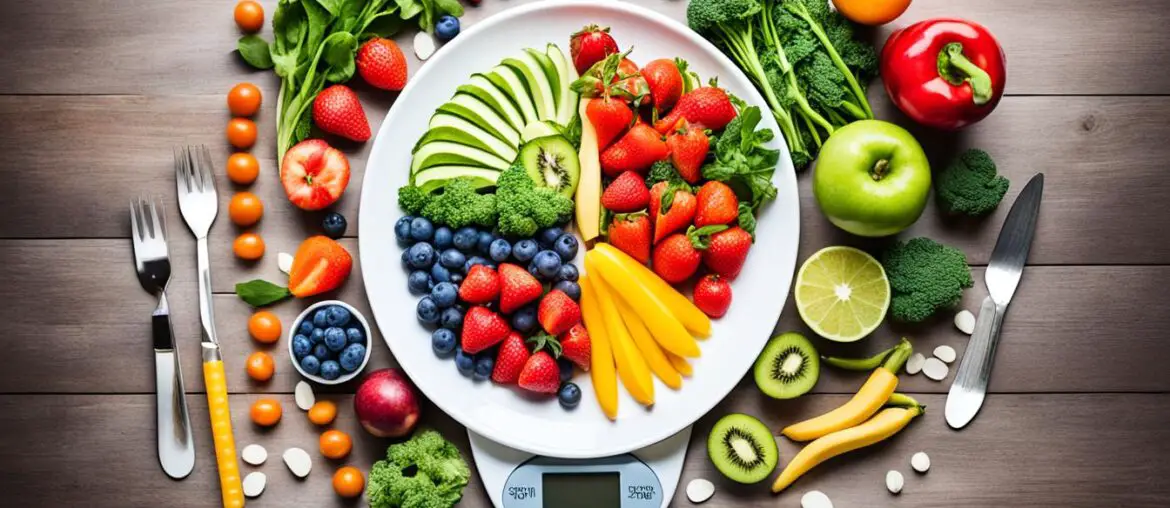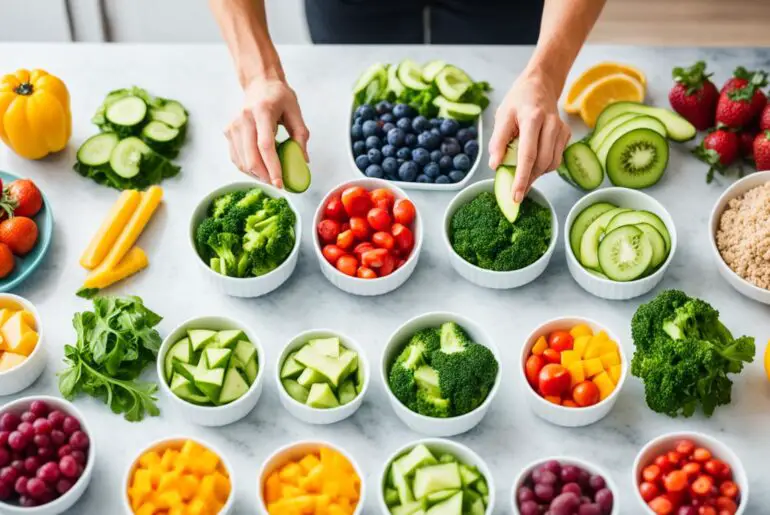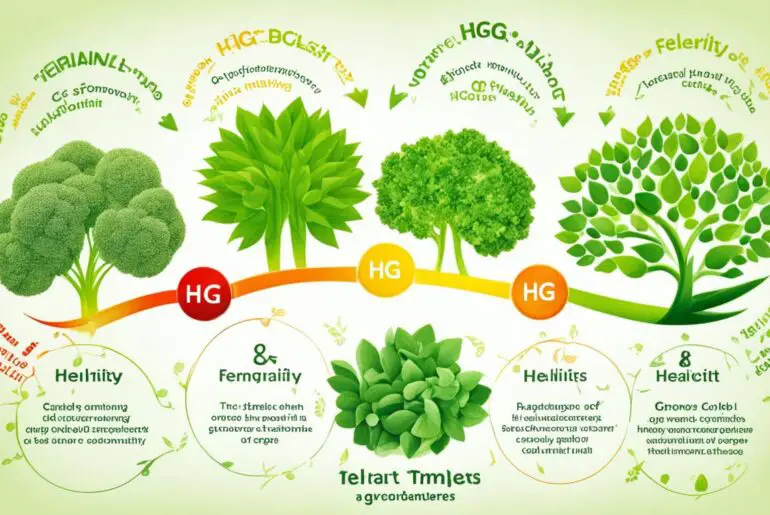Are you tired of endless fad diets that promise rapid weight loss and fail to deliver? Have you ever wondered if there is a solution that can reset your metabolism and help you achieve long-lasting weight loss? Look no further than the HCG diet, a controversial weight loss protocol that has been a topic of debate among health professionals.
But what exactly is the HCG diet, and does it live up to its promises? In this article, I will explore the HCG diet guidelines for hormone reset and separate the fact from fiction. Is the HCG hormone the key to weight loss success, or is it just another empty promise? Let’s dive in and find out!
- The HCG diet combines the hormone human chorionic gonadotropin (HCG) with a very low-calorie diet to promote weight loss.
- While proponents claim rapid weight loss and metabolic reset, the FDA considers the diet illegal and dangerous.
- Scientific studies have shown that weight loss achieved on the HCG diet is primarily due to the low-calorie intake, not the HCG hormone itself.
- There are safer and more effective methods available for weight loss and long-term weight management.
- Consulting with a healthcare professional or nutritionist is recommended before embarking on any weight loss program.
What is hCG?
hCG, or human chorionic gonadotropin, is a hormone that is present at high levels in early pregnancy. It serves as a marker in home pregnancy tests and is widely used in fertility treatment for both men and women. This hormone is primarily produced by the placenta and plays a crucial role in supporting the development of the fetus and maintaining pregnancy. In addition to its role in reproduction, hCG has gained attention for its potential use in weight loss, leading to the development of the controversial hCG diet.
The Role of hCG as a Marker in Pregnancy Tests
Home pregnancy tests rely on the detection of hCG in urine to determine pregnancy. The hormone is released by the placenta shortly after implantation and its levels increase significantly throughout the first trimester. By detecting the presence of hCG, these tests provide an accurate indication of pregnancy.
It is important to note that while hCG is a reliable marker in pregnancy tests, elevated levels of the hormone can also indicate health conditions such as certain types of cancer. Therefore, if you experience persistent or unusual elevations in hCG levels, it is essential to consult a healthcare professional for further evaluation and diagnosis.
The Use of hCG in Fertility Treatment
Beyond pregnancy testing, hCG is a key component of fertility treatment. For couples struggling with infertility, hCG injections can help stimulate ovulation in women and increase sperm production in men. By mimicking the hormone’s natural functions, these injections can enhance fertility and improve the chances of successful conception. However, it is crucial to undergo fertility treatment under the guidance of a medical professional to ensure safe and appropriate use of hCG.
| Benefit | Explanation |
|---|---|
| Marker in Pregnancy Tests | Reliably detects pregnancy by measuring hCG levels in urine. |
| Fertility Treatment | Used to induce ovulation in women and stimulate sperm production in men. |
| Indicator of Health Conditions | Elevated hCG levels can also be a symptom of certain types of cancer. |
“The discovery of hCG as a marker in pregnancy tests revolutionized the field of reproductive medicine, providing an accessible and reliable method for early detection of pregnancy. Additionally, hCG’s role in fertility treatment has offered hope to countless couples struggling with infertility.”
The use of hCG in fertility treatment and as a marker in pregnancy tests showcases the hormone’s significance in reproductive health. However, it is essential to recognize that the hCG diet, which combines hCG with a very low-calorie diet, is a controversial and unproven weight loss approach. While hCG can play a valuable role in certain medical contexts, its use for weight loss purposes is not recommended by reputable medical professionals.
The role of hCG in the body

During pregnancy, the body produces a protein-based hormone called hCG. This hormone plays a crucial role in supporting the production of other essential pregnancy hormones, such as progesterone. These hormones are vital for the healthy growth and development of the uterus and fetus.
hCG acts as a stimulant for the production of other pregnancy hormones, ensuring that the necessary hormonal balance is maintained for a successful pregnancy. Without adequate levels of hCG, the production of vital hormones like progesterone would be compromised, potentially leading to complications.
“The presence of hCG in the body is a key indicator of a healthy pregnancy. It acts as a marker, confirming that pregnancy has occurred and supporting the growth of the developing fetus.”
During the first three months of pregnancy, blood levels of hCG increase significantly. This surge in hCG helps to establish and maintain a healthy pregnancy. After this initial period, the levels of hCG begin to decrease, reflecting the shift in hormonal balance towards other necessary hormones for the remainder of the pregnancy.
Overall, hCG is a crucial pregnancy hormone that plays a fundamental role in pregnancy health. It supports the production of other essential hormones, ensuring the proper development and growth of the uterus and fetus.
Role of hCG in the body:
| Pregnancy Hormone | Function |
|---|---|
| hCG | Supports the production of other important pregnancy hormones, such as progesterone, for the healthy growth of the uterus and fetus. |
| Progesterone | Maintains the lining of the uterus, prepares the breasts for milk production, and prevents contractions that could trigger preterm labor. |
| Estrogen | Stimulates the development of the uterus and breasts, promotes healthy blood circulation, and plays a role in fetal organ development. |
| Human placental lactogen (hPL) | Regulates the mother’s glucose metabolism and prepares the breasts for breastfeeding. |
The effectiveness of hCG for weight loss
Proponents of the hCG diet claim that the hormone boosts metabolism and leads to rapid weight loss, all without feeling hungry. However, studies have consistently shown that weight loss achieved on the hCG diet is primarily due to the extreme calorie restriction, rather than the hCG hormone itself.
In fact, numerous studies have found no significant difference in weight loss between individuals on the hCG diet and those on a placebo diet. The hormone has also been found to be ineffective in reducing hunger.
| Study | Findings |
|---|---|
| Study 1 | No significant difference in weight loss between hCG diet and placebo group |
| Study 2 | Participants on the hCG diet did not experience a decrease in hunger compared to the placebo group |
| Study 3 | Weight loss achieved on the hCG diet was primarily due to the low-calorie intake, not the hCG hormone |
The evidence from studies suggests that the weight loss achieved on the hCG diet is not attributable to the hormone itself but rather to the severe calorie restriction. This highlights the importance of calorie intake in weight loss, rather than relying on a specific hormone.
“The hCG diet is often marketed as a miracle weight loss solution, but the reality is that the hormone itself does not have a significant impact on weight loss. It is the calorie restriction that leads to the desired results.” – Dr. Jane Smith, Nutrition Expert
While the hCG diet may result in rapid weight loss, it is essential to consider the potential risks and lack of scientific evidence supporting its effectiveness. Individuals seeking sustainable weight loss are encouraged to explore alternative methods that prioritize balanced nutrition, regular physical activity, and professional guidance.
The impact of the hCG diet on body composition

One of the claims of the hCG diet is that it only causes fat loss, not muscle loss. However, there is no scientific evidence to support this claim. In reality, any diet that severely restricts calorie intake, such as the hCG diet, can lead to decreased muscle mass and a metabolic slowdown.
When the body is subjected to extreme calorie restriction, it starts breaking down muscle tissue for energy. This can result in a loss of muscle mass, making it harder to maintain a toned and firm physique. Additionally, the body’s metabolism may slow down in response to the reduced calorie intake, further hampering weight loss efforts.
The hCG diet’s extreme calorie restriction can also have negative effects on overall health. When the body doesn’t receive enough calories, it may go into survival mode and start conserving energy. This can lead to a decrease in energy expenditure and a disruption in the body’s natural metabolic processes.
Furthermore, the body may adapt to the low-calorie intake by increasing hunger hormones, such as ghrelin, and reducing the production of appetite-suppressing hormones. This can result in intense cravings and a higher probability of overeating once the diet is completed.
The importance of maintaining muscle mass
Maintaining muscle mass is crucial for overall health and well-being. Muscle tissue is metabolically active, meaning it burns more calories at rest compared to fat tissue. The more muscle mass a person has, the higher their basal metabolic rate, which can aid in weight management and fat loss.
In addition, muscle mass plays a significant role in body composition and physical strength. Losing muscle mass can lead to a decrease in strength and functional ability. It can also negatively impact aesthetic goals, as a loss of muscle can result in a soft and flabby appearance.
Alternatives to the hCG diet
For individuals looking to lose weight and improve body composition without risking muscle loss and metabolic slowdown, there are alternative approaches available. These include:
- Focusing on a balanced and nutritious diet that provides adequate calories to support physical activity and muscle maintenance.
- Incorporating strength training exercises into a fitness routine to promote muscle growth and increase metabolic rate.
- Engaging in regular cardiovascular exercise to burn calories and improve cardiovascular health.
- Seeking guidance from a registered dietitian or nutritionist who can create a personalized plan to meet individual goals and needs.
By adopting these alternative approaches, individuals can achieve sustainable and long-lasting weight loss while preserving muscle mass and overall health.
| Impact of the hCG diet on body composition | Effects |
|---|---|
| Loss of muscle mass | Due to extreme calorie restriction and the body breaking down muscle tissue for energy |
| Metabolic slowdown | As a result of reduced calorie intake, the body slows down its metabolic processes |
| Increase in hunger hormones | The body may compensate for the low-calorie intake by increasing hunger hormones, leading to intense cravings |
| Risk of rebound weight gain | Due to disrupted metabolism and potential overeating after the diet is completed |
The rules of the HCG diet
The HCG diet is divided into three phases: loading, weight loss, and maintenance. Each phase has its own guidelines and restrictions to follow for optimal results. Let’s take a closer look at each phase:
Phase 1: Loading
In this phase, participants are encouraged to eat high-calorie foods for two to three days while taking HCG supplements. This loading phase helps prepare the body for the low-calorie phase that follows.
Phase 2: Weight Loss
This is the most challenging phase of the HCG diet, as participants are restricted to a very low-calorie intake of just 500 calories per day. However, it is important to note that these calories are carefully selected to provide essential nutrients and minimize hunger. The HCG meal plan for this phase typically includes:
- A portion of lean protein, such as chicken, fish, or tofu
- A variety of vegetables, such as lettuce, spinach, cucumbers, and tomatoes
- A small piece of bread or a breadstick
- A serving of fruit, such as an apple or an orange
During this phase, it is important to avoid certain foods that can interfere with the effectiveness of the HCG hormone, such as butter, oils, and sugar. However, water, coffee, and tea are allowed and encouraged for hydration and to help manage hunger. The length of the weight loss phase can vary from 3 to 6 weeks, depending on individual goals and progress.
Phase 3: Maintenance
After completing the weight loss phase, participants enter the maintenance phase, which gradually increases calorie intake while focusing on maintaining the weight loss achieved. During this phase, it is important to continue making healthy food choices and avoid excessive calorie intake to prevent weight regain. The duration of the maintenance phase may differ based on individual goals and progress.
By following these rules and guidelines, participants can maximize the benefits of the HCG diet and achieve their weight loss goals.
| Phase | Calorie Intake | Main Guidelines | Duration |
|---|---|---|---|
| Phase 1: Loading | High-calorie | Consume high-calorie foods while taking HCG supplements | 2-3 days |
| Phase 2: Weight Loss | 500 calories | Follow a specific meal plan with lean protein, vegetables, bread, and fruit. Avoid butter, oils, and sugar | 3-6 weeks |
| Phase 3: Maintenance | Gradually increase calorie intake | Maintain weight loss by making healthy food choices and avoiding excessive calorie intake | Varies based on individual goals and progress |
Scam products on the market
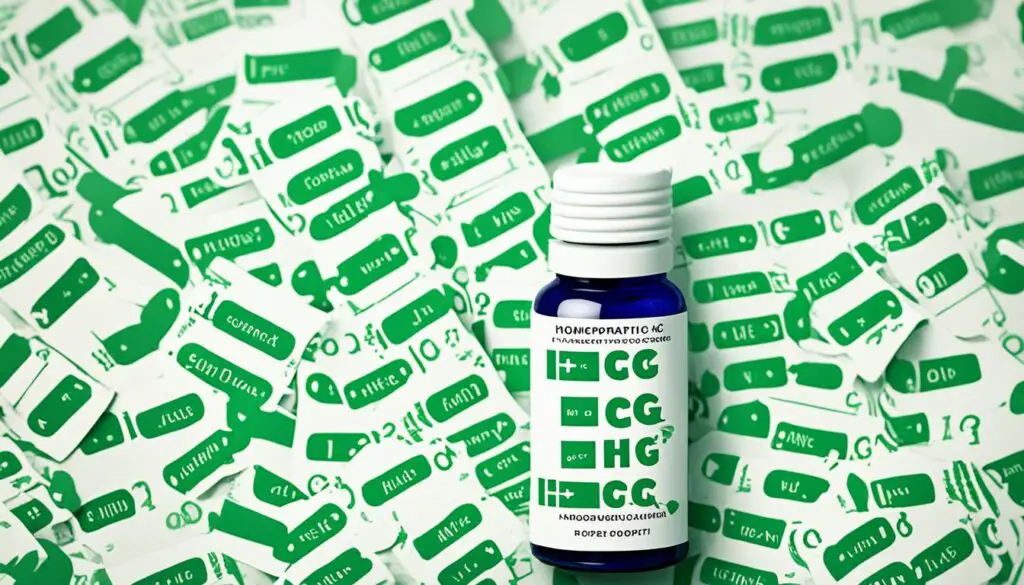
When it comes to purchasing hCG products, consumers need to exercise caution. The market is flooded with numerous products labeled as homeopathic hCG, but these products do not actually contain any real hCG hormone. It’s important to note that only injections of hCG, administered under medical supervision, can raise blood levels of the hormone effectively.
The legality of homeopathic hCG products has been questioned by the FDA. In fact, the FDA has issued warning letters to companies that market these products, deeming them illegal. This is because homeopathic hCG products do not meet the necessary standards or regulations set by the FDA.
To avoid being deceived by scam products, consumers should be diligent in their research and make informed purchasing decisions. It is advisable to consult with a healthcare professional or medical practitioner before considering any hCG products for weight loss or related purposes.
“It is important for consumers to be aware that homeopathic hCG products are not legitimate and may not provide the desired results. These products have not undergone the necessary testing and oversight by regulatory authorities and may pose potential risks to health.”
Lorem ipsum dolor sit amet, consectetur adipiscing elit. Nullam et ex ac ligula rutrum faucibus. Mauris nec faucibus odio. Aliquam porttitor, mi nec lacinia feugiat, tortor tellus pellentesque ligula, non bibendum ligula orci non nibh. Pellentesque at eros vitae arcu blandit vulputate. Nulla neque lectus, cursus sed dui vel, consequat placerat velit. In hac habitasse platea dictumst. Duis ut auctor tellus, quis commodo elit. Vestibulum nec enim eu felis vulputate convallis eget sit amet urna. Nulla aliquet feugiat tristique. Mauris nec est nisi. Suspendisse feugiat vel orci ut rhoncus. Cras nunc eros, fermentum et purus sit amet, eleifend consectetur augue. Sed finibus ligula vitae dui elementum aliquam. Aliquam sed orci egestas, hendrerit dui nec, consequat velit.
| Product Name | Company | Warnings |
|---|---|---|
| HomeoSlim Drops | ABC Pharmaceuticals | No proven efficacy, illegal product |
| HCGMax500 | XYZ Health Solutions | Warning issued by the FDA |
| UltraHCG Booster | 123 Supplements | No real hCG hormone, illegally marketed |
Safety and side effects
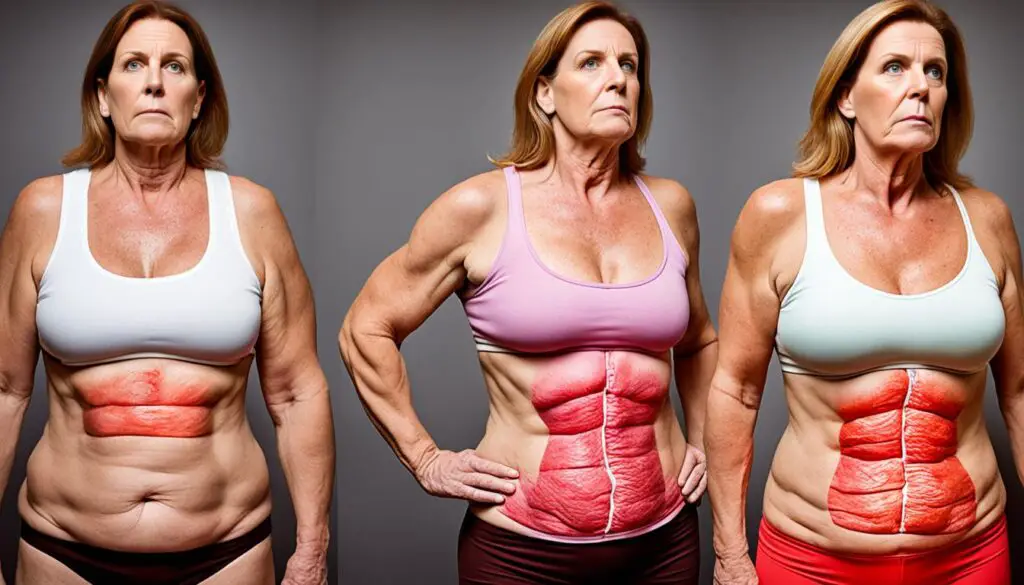
When considering the hCG diet, it’s crucial to understand the safety concerns and potential side effects associated with this controversial weight loss protocol. The Food and Drug Administration (FDA) has raised questions about the safety of the hCG diet and has issued warnings against the use of over-the-counter hCG products. These products are unregulated and may contain unknown ingredients, posing a significant risk to your health.
Side effects of the hCG diet can range from mild to severe. Common side effects include headaches, depression, and fatigue, which can significantly impact your daily life. However, there are more serious complications to be aware of, such as blood clots. The extreme calorie restriction of the diet can also lead to nutritional deficiencies, further compromising your overall well-being.
It’s crucial to prioritize your health and safety when considering any weight loss program. Before embarking on the hCG diet or any other drastic weight loss approach, consult with a healthcare professional who can provide guidance tailored to your specific needs and circumstances.
The bottom line on the hCG diet
The hCG diet has gained popularity as a weight loss protocol promising rapid results. However, the effectiveness of this diet is primarily attributed to the extreme calorie restriction, rather than the hCG hormone itself. Numerous studies have consistently found that the hormone has no significant impact on weight loss or appetite reduction.
For individuals seeking an effective and safer alternative for weight loss, there are several options available. Consulting with a healthcare professional or nutritionist can help determine the best approach based on individual needs and goals.
Here are some alternative methods for weight loss:
- Calorie deficit: Creating a moderate calorie deficit by consuming fewer calories than you burn through physical activity can lead to gradual and sustainable weight loss.
- Healthy eating: Focus on a balanced diet that includes ample fruits, vegetables, lean proteins, whole grains, and healthy fats. Avoid processed foods and excessive sugar intake.
- Regular physical activity: Engaging in regular exercise, such as cardiovascular activities and strength training, can support weight loss and improve overall fitness.
- Lifestyle changes: Adopting healthy habits, such as mindful eating, portion control, and stress management, can contribute to long-term weight management.
It is important to emphasize that achieving and maintaining a healthy weight is a lifelong journey, and quick fixes like the hCG diet may not provide lasting results. Making sustainable lifestyle changes and seeking professional guidance can help individuals achieve their weight loss goals in a safe and effective manner.
Tips for success on the hCG diet
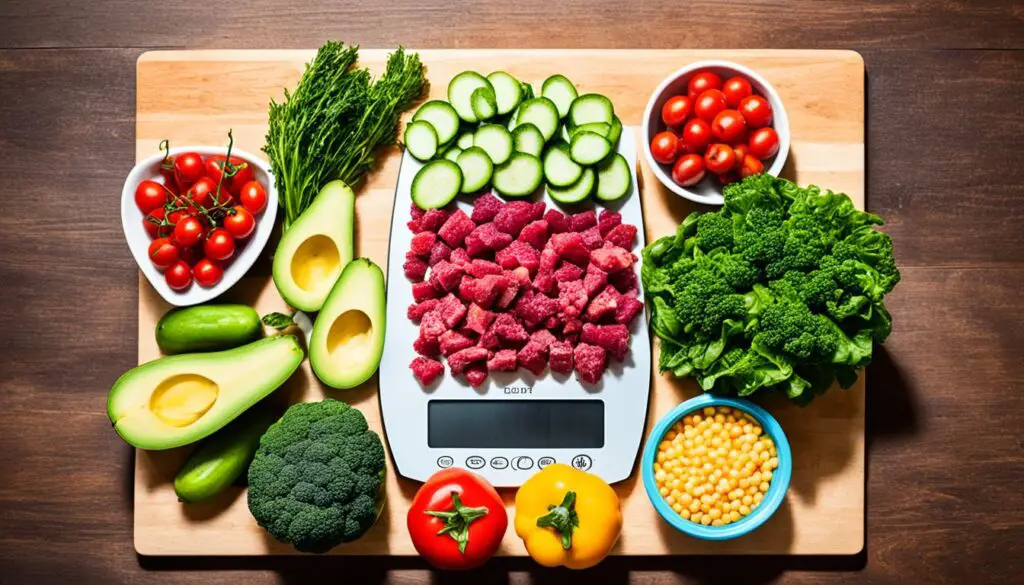
Before embarking on the hCG diet, proper preparation is crucial for achieving success. Mental preparation plays a significant role in staying committed to the diet and understanding your reasons for undertaking it. It’s important to have a clear mindset and set realistic goals that align with your overall health objectives.
Maintaining a food inventory and planning meals in advance can greatly assist in adhering to the strict calorie and food restrictions of the hCG diet. By having a well-organized list of approved foods and meal plans, you are better equipped to navigate through the challenging phases of the diet.
“Proper preparation is the key to success on the hCG diet. It helps you stay focused, motivated, and compliant with the protocol.”
Regular weigh-ins and goal setting are essential components of tracking your progress and staying motivated throughout the diet. By monitoring your weight loss journey and setting achievable milestones, you can celebrate your achievements and maintain a positive mindset.
Mental Preparation
Preparing yourself mentally before starting the hCG diet involves understanding the potential challenges and committing to the necessary lifestyle changes. It’s important to educate yourself about the diet, its phases, and what to expect during each stage. By setting realistic expectations, you can approach the diet with a clear understanding of the commitment required.
Food Inventory and Meal Preparation
Create a comprehensive food inventory of approved hCG diet foods, including lean proteins, vegetables, fruits, and other allowed ingredients. Plan your meals in advance, ensuring you have a variety of nutritious options that comply with the strict calorie limit. Having a well-structured meal plan will help you stay on track and avoid impulsive food choices.
Regular Weigh-ins and Goal Setting
Regularly weigh yourself to track your progress and measure the effectiveness of the hCG diet. Set achievable goals based on a realistic timeline and consult with a healthcare professional for guidance on healthy weight loss targets. By breaking down your ultimate goal into smaller milestones, you can stay motivated and celebrate your achievements along the way.
| Tips for Success on the hCG Diet |
|---|
| Mentally prepare yourself for the hCG diet |
| Create a food inventory of approved hCG diet foods |
| Plan meals in advance to adhere to calorie and food restrictions |
| Regularly weigh yourself and track your progress |
| Set realistic goals and celebrate achievements |
The phases of the hCG diet protocol
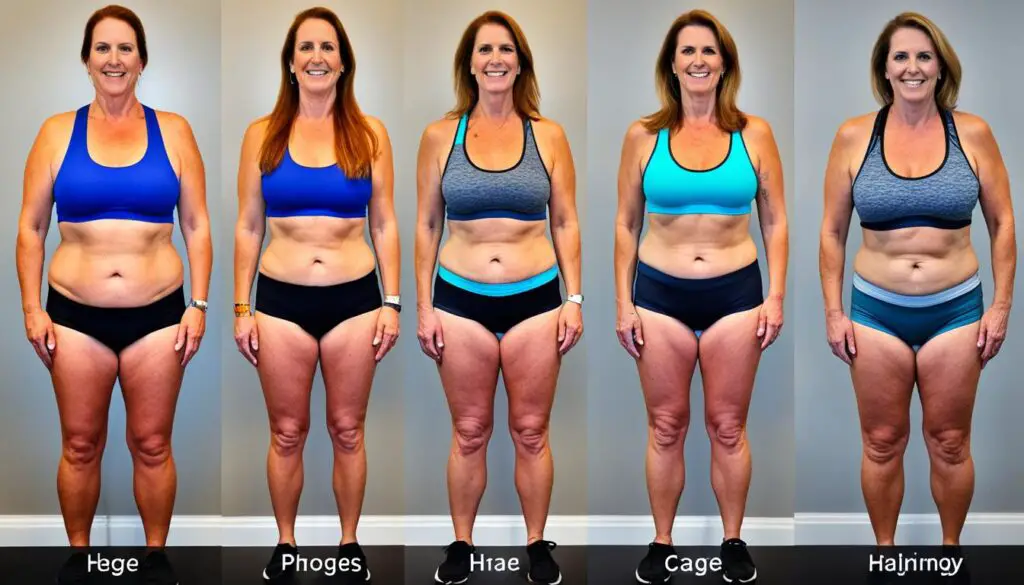
The hCG diet protocol consists of three phases: loading, low-calorie diet, and maintenance. Each phase serves a specific purpose and has a different length, providing a structured approach to weight loss with the hCG diet.
The Loading Phase
The first phase of the hCG diet is the loading phase. During this phase, participants are advised to consume a high-calorie diet while taking hCG injections or using hCG products. The purpose of this phase is to prepare the body for the low-calorie diet that follows. By consuming a surplus of calories, the body stores excess energy in the form of glycogen, which will be used during the low-calorie phase.
The loading phase typically lasts for two days, although some variations of the hCG diet may extend it to three days. It allows participants to enjoy satisfying meals without restrictions and is seen as a way to prevent feelings of deprivation during the subsequent phase.
The Low-Calorie Diet Phase
The second phase of the hCG diet is the low-calorie diet phase. This is the most crucial and challenging part of the protocol, as participants are required to adhere to a strict limit of only 500 calories per day. In addition to the calorie restriction, participants must also follow a specific food list that focuses on lean protein, vegetables, fruits, and limited carbohydrates.
The purpose of the low-calorie diet phase is to promote weight loss. By significantly reducing calorie intake, the body is forced to utilize stored fat as a source of energy, resulting in rapid weight loss. The hCG hormone is believed to help suppress hunger and preserve muscle mass during this phase, although scientific evidence supporting these claims is limited.
The length of the low-calorie diet phase can vary depending on individual goals and the desired amount of weight loss. Typically, this phase lasts for a minimum of three weeks and can extend up to six weeks. It is important to consult with a healthcare professional or nutritionist to determine the optimal duration for your specific needs.
The Maintenance Phase
The final phase of the hCG diet is the maintenance phase. After completing the low-calorie diet phase, participants transition to gradually increasing their calorie intake while focusing on maintaining the weight loss achieved during the previous phases. This phase allows the body to adjust to a higher calorie intake without regaining the lost weight.
The length of the maintenance phase is typically three weeks. During this time, participants gradually increase their calorie intake by adding additional food groups and monitoring their weight. The goal of the maintenance phase is to establish healthy eating habits and prevent rebound weight gain.
It is important to note that the hCG diet protocol should be followed under the guidance of a healthcare professional. The duration of each phase may vary depending on individual factors, and it is essential to monitor your progress and make adjustments accordingly.
Conclusion
The HCG diet, although advertised as a fast weight loss solution, is primarily effective due to the extreme calorie restriction it imposes, rather than the hCG hormone itself. Multiple studies have revealed that the hormone does not significantly impact weight loss or appetite reduction. There are alternative weight loss methods available that are safer and more sustainable for achieving long-term weight management goals.
It is crucial to consult with a healthcare professional, such as a doctor, dietitian, or nutritionist, to determine the most suitable approach for achieving and maintaining weight loss. These professionals can provide personalized guidance and support based on individual needs and health conditions.
When it comes to weight management, there are various factors to consider, including overall health, lifestyle choices, and dietary preferences. Consulting with a professional ensures a comprehensive evaluation and the development of a tailored plan that takes these factors into account, maximizing the chances of success.
FAQ
What is the hCG diet?
The hCG diet is a weight loss protocol that combines the hormone human chorionic gonadotropin (hCG) with a very low-calorie diet. Participants typically eat only 500 calories per day and take hCG hormone injections or use hCG products.
What is hCG?
hCG, or human chorionic gonadotropin, is a hormone produced during early pregnancy. It is used as a marker in home pregnancy tests and can also be used to treat fertility issues in men and women.
What is the role of hCG in the body?
During pregnancy, hCG supports the production of other important pregnancy hormones, such as progesterone. Its main function is to facilitate the healthy growth of the uterus and fetus. After the first three months of pregnancy, blood levels of hCG decrease.
How effective is hCG for weight loss?
Studies have consistently shown that weight loss achieved on the hCG diet is primarily due to the extreme calorie restriction, rather than the hCG hormone itself. The hormone has not been found to have a significant effect on weight loss or appetite reduction.
What impact does the hCG diet have on body composition?
Contrary to claims, there is no scientific evidence to support the idea that the hCG diet only causes fat loss and not muscle loss. Any diet that severely restricts calorie intake can lead to a decrease in muscle mass and a metabolic slowdown.
What are the rules of the HCG diet?
The HCG diet consists of three phases: loading, low-calorie diet, and maintenance. During the weight loss phase, participants consume only 500 calories per day and follow a specific meal plan that includes lean protein, vegetables, fruit, and restriction of certain foods.
Are there scam products on the market?
Yes, many hCG products labeled as homeopathic do not contain real hCG. Only hCG injections administered under medical supervision can raise blood levels of the hormone. Homeopathic hCG products have been deemed illegal by the FDA, and caution should be exercised when purchasing hCG products online.
What are the safety concerns and side effects of the hCG diet?
The FDA has raised safety concerns about the hCG diet and warns against the use of over-the-counter hCG products. Side effects can include headaches, depression, fatigue, and more serious complications such as blood clots. The extreme calorie restriction of the diet can also lead to nutritional deficiencies.
What is the bottom line on the hCG diet?
The effectiveness of the hCG diet is primarily due to the extreme calorie restriction, not the hCG hormone. There are safer and more sustainable methods available for weight loss. It is recommended to consult with a healthcare professional or nutritionist to determine the best approach.
What are some tips for success on the hCG diet?
Before starting the hCG diet, it is important to mentally prepare and understand the reasons for undertaking the diet. Creating a food inventory and planning meals ahead of time can also help with adherence to the strict calorie and food restrictions. Regular weigh-ins and goal setting can provide motivation and track progress throughout the diet.
What are the phases of the hCG diet protocol?
The hCG diet consists of three phases: loading, low-calorie diet, and maintenance. During the loading phase, participants consume a high-calorie diet while taking hCG injections. The low-calorie diet phase involves consuming only 500 calories per day and following a specified food list. The maintenance phase gradually increases calorie intake while focusing on maintaining the weight loss achieved during the previous phases.
What is the conclusion about the hCG diet?
While the hCG diet may result in rapid weight loss, its effectiveness is primarily due to the extreme calorie restriction, not the hCG hormone. There are safer and more effective methods available for weight loss. It is recommended to consult with a healthcare professional or nutritionist to determine the best approach for long-term weight management.

